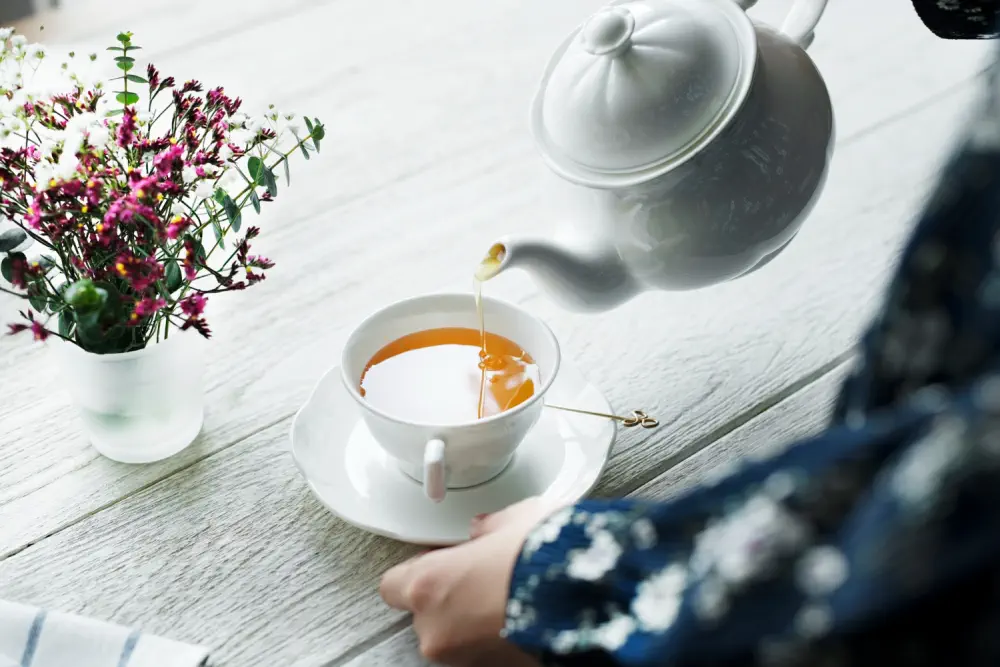We offer medical detox and multiple addiction treatment options in our
luxury treatment centres in Port Hope, Cobourg, and Ottawa.
Tea Addiction and How It Creeps Into Daily Life
Morning rituals carry power. Steam rises from your favourite mug while you prepare for another day, and that first warm sip delivers exactly what you need. Across Canada, millions share this moment—the gentle awakening that only tea provides. Yet somewhere between appreciation and necessity, a line gets crossed. Tea addiction sneaks into daily routines so quietly that most people never notice when their comforting habit becomes something they genuinely cannot live without.
Key Takeaways
- Recognition Comes Late: Tea addiction builds gradually through increased daily consumption—withdrawal symptoms reveal dependency has already taken hold.
- Brain Chemistry Changes: Caffeine blocks natural fatigue signals while triggering reward pathways—your body stops producing its own alertness chemicals.
- Life Revolves Around Brewing: Daily schedules reshape around tea breaks—social plans depend on brewing access and timing.
- Withdrawal Hits Hard: Symptoms of tea addiction include headaches, fatigue, and mood changes—physical discomfort can last over a week.
- Recovery Takes Strategy: Breaking free requires gradual reduction and alternative habits—professional support often proves necessary for lasting change.
What Is Tea Addiction, and Is It Actually Real?

Tea addiction represents genuine physical dependence on caffeine delivered through regular tea consumption. Your brain develops tolerance, requiring increasing amounts to achieve the same alertness and comfort. When tea becomes unavailable, withdrawal symptoms emerge—headaches, irritability, fatigue, and difficulty concentrating.
Medical professionals recognize caffeine use disorder, though "tea addiction" itself doesn't appear in diagnostic manuals. The distinction matters less than the reality: people experience genuine distress and functional impairment when unable to access their daily tea. Is tea addictive? Absolutely. Caffeine blocks adenosine receptors that signal tiredness while triggering dopamine release in reward pathways.
This creates both physical dependence and psychological attachment. Unlike alcohol or opioids, tea addiction rarely threatens immediate health or safety. However, the inability to function normally without multiple daily cups, failed attempts to reduce consumption, and lifestyle disruption around tea availability indicate real dependency requiring attention and potential intervention.
What Makes Tea Different from Other Caffeinated Beverages?
Tea gets a free pass that coffee never receives. Your coworker who judges your third espresso will happily sip their sixth cup of Earl Grey without a second thought. This double standard exists because tea carries a health halo that obscures its addictive potential.
Tea contains L-theanine, an amino acid that smooths out caffeine's jittery edges. While coffee delivers a sharp energy spike followed by a crash, tea provides sustained alertness that feels more natural. This gentler experience tricks people into thinking tea "doesn't count" as a stimulant. You might drink twice as much tea as someone drinks coffee and never make the connection.
Cultural perceptions amplify this blind spot. Tea represents wellness, mindfulness, and sophistication. Coffee suggests dependency and rushed mornings. Society celebrates the tea enthusiast while side-eyeing the coffee addict, even when both consume identical amounts of caffeine daily.
The ritual element creates another layer of attachment. Brewing tea demands time and attention—selecting leaves, timing steeps, choosing the perfect mug. These ceremonies embed psychological dependence alongside physical addiction. You're not just craving caffeine; you're craving the comfort, control, and identity that tea rituals provide.
Is tea addictive in ways coffee isn't? Not exactly. But tea's reputation as a "healthy habit" allows addiction to flourish unrecognized. People dismiss their dependency as self-care rather than examining whether they can actually function without their daily doses.
Why Does Tea Addiction Develop So Gradually?

Tea addiction doesn't announce itself with dramatic moments or obvious warning signs. Instead, it builds through tiny daily choices that seem perfectly reasonable at the time.
Most people start with a single morning cup, perhaps green tea for antioxidants or chamomile for relaxation. Within weeks, one cup becomes two. The afternoon energy dip requires another boost, and tea feels like the healthiest option available. Before long, you're reaching for a mug whenever stress peaks or concentration wavers.
Your brain adapts to this steady caffeine supply by reducing its own production of natural alertness chemicals. Tolerance develops as adenosine receptors multiply, demanding higher doses to achieve the same mental clarity. What once felt like an energy boost now becomes maintenance. You're not drinking tea to feel great, you're drinking it to feel normal.
The progression typically unfolds like this:
- Weeks 1-2: Single daily cup provides noticeable benefits
- Month 1: Adding a second cup for afternoon performance
- Months 2-3: Tea becomes an automatic response to stress or fatigue
- Months 4-6: Missing tea causes discomfort and poor concentration
- Beyond 6 months: Multiple daily cups become non-negotiable
Social and cultural factors accelerate this process. Tea breaks structure workdays, family gatherings revolve around brewing rituals, and emotional conversations happen over steaming mugs. The beverage becomes woven into your identity and relationships, making dependency feel like a social connection rather than chemical dependence.
By the time withdrawal symptoms appear, the addiction has already established deep roots in both brain chemistry and daily routine.
What Are the Warning Signs Your Tea Habit Has Crossed the Line?
The shift from enjoying tea to needing it happens so slowly that many people miss the transition entirely. One day you're savouring an occasional cup, and the next you're calculating how many hours until your next tea break.
It might sound awkward, but recognizing addiction requires an honest assessment of how tea fits into your daily functioning. The clearest indicator isn't how much you drink, but what happens when you can't drink it. Physical dependency creates predictable patterns that extend beyond simple preference.
❗Warning signs that tea has become more than a habit:
- Morning dysfunction: Unable to think clearly or start tasks without tea
- Escalating consumption: Three cups used to work, now you need five or six
- Failed reduction attempts: Promising to cut back but returning to old patterns within days
- Mood tied to availability: Anxiety or irritation when tea isn't accessible
- Schedule disruption: Planning activities around tea breaks or avoiding situations without tea access
- Physical withdrawal: Headaches, fatigue, or concentration problems when missing regular doses
These symptoms of tea addiction often develop alongside increasing tolerance. Your body requires more caffeine to achieve the alertness that smaller amounts once provided. The gap between what you need to feel normal and what you need to feel energized continues widening.
Social relationships may start revolving around tea rituals. You choose restaurants based on their tea selection, feel uncomfortable at gatherings without proper brewing equipment, or find conversations difficult without a mug in hand. When tea becomes essential for basic social and professional functioning, dependency has clearly established itself.
How Do Withdrawal Symptoms Manifest When You Stop Drinking Tea?

Skip your usual morning cup and notice what happens next. For casual drinkers, missing tea might mean slight drowsiness. For those with established habits, the experience proves far more unpleasant.
Withdrawal begins when your brain expects its regular caffeine dose but doesn't receive it. Blood vessels that caffeine normally constricts start expanding, triggering the pounding headaches that define early withdrawal. Your body has stopped producing adequate natural energy chemicals, leaving you dependent on external sources.
The timeline typically unfolds predictably:
Physical symptoms of tea addiction withdrawal affect nearly every aspect of daily functioning. Headaches range from dull pressure to migraine-level intensity that makes concentration nearly impossible. Fatigue hits like a wall, not just tiredness, but bone-deep exhaustion that sleep doesn't relieve. Simple tasks feel overwhelming when your brain lacks its accustomed chemical support.
Mood disturbances create additional challenges. Irritability surfaces over minor frustrations that normally wouldn't register. Depression can emerge, particularly for people who rely on tea's mood-lifting effects to manage stress or emotional difficulties. Anxiety may spike as your nervous system struggles to regulate itself without caffeine's familiar influence.
Cognitive symptoms often prove most disruptive professionally. Mental fog makes decision-making sluggish, while memory problems affect work performance. The inability to sustain attention compounds these difficulties, leaving many people feeling genuinely impaired.
Individual experiences vary considerably. Some people sail through with minor discomfort, while others face weeks of significant symptoms that interfere with relationships and responsibilities.
When Should You Consider Professional Help for Tea Addiction?
Nobody expects to need help with tea. It sounds almost ridiculous until you're living it.
Tea addiction feels different from other dependencies because it hides behind health benefits and social acceptability. You might dismiss your struggle as weakness or overthinking. The truth? Dependency is dependency, regardless of the substance involved.
If the warning signs and withdrawal symptoms we've covered sound familiar, you're not imagining things. Your brain has adapted to regular caffeine doses, and breaking that pattern can prove surprisingly difficult alone. Some people white-knuckle through multiple failed attempts, convinced they should manage this themselves.
Professional support changes the game entirely. Addiction specialists understand exactly why your previous attempts didn't stick and can design strategies that actually work for your situation. They help separate physical dependence from whatever emotional needs tea might be filling—stress relief, energy management, or social comfort.
The process doesn't require dramatic interventions. Most tea addiction treatment involves practical planning, gradual reduction techniques, and addressing underlying patterns that drive excessive consumption.
At the Canadian Centre for Addictions, we've helped people overcome dependencies that seemed impossible to break alone. Tea addiction might feel minor compared to other substances, but any habit that controls your daily life deserves attention. Ready to take back control? Call us at 1-855-499-9446 or contact us for a confidential conversation about your next steps.
FAQ
Is tea addictive in the same way as other substances?
Tea addiction creates genuine physical dependence through caffeine, causing withdrawal symptoms and functional impairment when stopped. While not as severe as alcohol or opioids, the brain chemistry changes are real and measurable.
How much tea consumption becomes problematic?
Addiction isn't defined by quantity but by the inability to function without tea, failed reduction attempts, and experiencing withdrawal when stopping. Some people develop dependency on drinking just two cups daily, while others consume six cups without issues.
Can you be addicted to herbal teas that don't contain caffeine?
True addiction requires physical dependence, but you can develop psychological dependency on herbal tea rituals and comfort. This behavioural pattern rarely causes significant life disruption compared to caffeine-based tea addiction.
Are certain types of tea more addictive than others?
Black and green teas contain higher caffeine levels than white teas, making them potentially more habit-forming. However, individual sensitivity varies dramatically, and addiction depends more on consumption patterns than tea type.
How long does it take to overcome tea addiction?
Physical withdrawal symptoms typically peak within 1-3 days and resolve within a week. Breaking psychological habits and establishing new routines usually requires several weeks to months of consistent effort.






